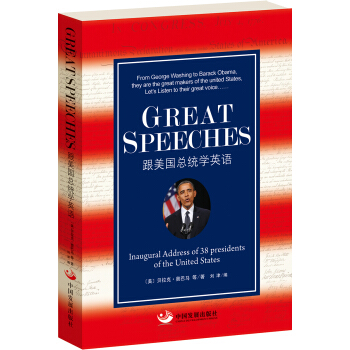

具体描述
编辑推荐
《Great Speeches:跟美国总统学英语》是美国38位总统的就职演说集,免费下载对应的原声录音与外教朗读,是英语学习者极有价值的读物。通过从乔治·华盛顿到贝拉克·奥巴马总统的演说中,读者也可以更好地了解美国各个阶段的政治、经济与历史文化。内容简介
From George Washington to Barack Obama, Presidents have used inaugural addresses to articulate their hopes and dreams for a nation. Collectively, these addresses chronicle the course of this country from its earliest days to the present.Inaugural addresses have taken various tones, themes and forms. Some have been reflective and instructive, while others have sought to challenge and inspire. Washington's second inaugural address on March 4, 1793 required only 135 words and is the shortest ever given. The longest on record-8495 words-was delivered in a snowstorm March 4, 1841 by William Henry Harrison.
Invoking a spirit of both history and patriotism, inaugural addresses have served to reaffirm the liberties and freedoms that mark our remarkable system of government. Many memorable and inspiring passages have originated from these addresses.
This collection includes the great inaugural addresses of 38 presidents of the United States. It is our hope that this volume will serve as an important and valuable reference for historians, scholars and English learners.
目录
01 George Washington (1789-1797)First Inaugural Address
Second Inaugural Address
02 John Adams (1797-1801)
Inaugural Address
03 Thomas Jefferson (1801-1809)
First Inaugural Address
Second Inaugural Address
04 James Madison (1809-1817)
First Inaugural Address
Second Inaugural Address
05 James Monroe (1817-1825)
First Inaugural Address
Second Inaugural Address
06 John Quincy Adams (1825-1829)
Inaugural Address
07 Andrew Jackson (1829-1837)
First Inaugural Address
Second Inaugural Address
08 Martin Van Buren (1837-1841)
Inaugural Address
09 William Henry Harrison (1841)
Inaugural Address
10 James Knox Polk (1845-1849)
Inaugural Address
11 Zachary Taylor (1849-1850)
Inaugural Address
12 Franklin Pierce (1853-1857)
Inaugural Address
13 James Buchanan (1857-1861)
Inaugural Address
14 Abraham Lincoln (1861-1865)
First Inaugural Address
Second Inaugural Address
15 Ulysses S. Grant (1869-1877)
First Inaugural Address
Second Inaugural Address
16 Rutherford B. Hayes (1877-1881)
Inaugural Address
17 James A. Garfield (1881)
Inaugural Address
18 Benjamin Harrison (1889-1893)
Inaugural Address
19 Grover Cleveland (1893-1897)
First Inaugural Address
Second Inaugural Address
20 William McKinley (1897-1901)
First Inaugural Address
Second Inaugural Address
21 Theodore Roosevelt (1901-1909)
Inaugural Address
22 William Howard Taft (1909-1913)
Inaugural Address
23 Woodrow Wilson (1913-1921)
First Inaugural Address
Second Inaugural Address
24 Warren G. Harding (1921-1923)
Inaugural Address
25 Calvin Coolidge (1923-1929)
Inaugural Address
26 Herbert Hoover (1929-1933)
Inaugural Address
27 Franklin D. Roosevelt (1933-1945)
First Inaugural Address
Second Inaugural Address
Third Inaugural Address
Fourth Inaugural Address
28 Harry S. Truman (1945-1953)
Inaugural Address
29 Dwight D. Eisenhower (1953-1961)
First Inaugural Address
Second Inaugural Address
30 John F. Kennedy (1961-1963)
Inaugural Address
31 Lyndon Baines Johnson (1963-1969)
Inaugural Address
32 Richard Milhous Nixon (1969-1974)
First Inaugural Address
Second Inaugural Address
33 Jimmy Carter (1977-1981)
Inaugural Address
34 Ronald Reagan (1981-1989)
First Inaugural Address
Second Inaugural Address
35 George Bush (1989-1993)
Inaugural Address
36 Bill Clinton (1993-2001)
First Inaugural Address
Second Inaugural Address
37 George W. Bush (2001-2009)
First Inaugural Address
Second Inaugural Address
38 Barack Obama (2009- )
First Inaugural Address
Second Inaugural Address
精彩书摘
Barack ObamaFirst Inaugural Address
Tuesday, January 20, 2009
[Barack Obama was inaugurated as the 44th President of the United States- becoming the first African American to serve in that office-on January 20, 2009.
The son of a white American mother and a black Kenyan father, Obama grew up in Hawaii. Leaving the state to attend college, he earned degrees from Columbia University and Harvard Law School. Obama worked as a community organizer in Chicago, where he met and married Michelle LaVaughn Robinson in 1992. Their two daughters, Malia Ann and Natasha (Sasha) were born in 1998 and 2001, respectively. Obama was elected to the Illinois state senate in 1996 and served there for eight years. In 2004, he was elected by a record majority to the U.S. Senate from Illinois and, in February 2007, announced his candidacy for President. After winning a closely-fought contest against New York Senator and former First Lady Hillary Rodham Clinton for the Democratic nomination, Obama handily defeated Senator John McCain of Arizona, the Republican nominee for President, in the general election.
When President Obama took office, he faced very significant challenges. The economy was officially in a recession, and the outgoing administration of George W. Bush had begun to implement a controversial "bail-out" package to try to help struggling financial institutions. In foreign affairs, the United States still had troops deployed in Iraq and Afghanistan, and warfare had broken out between Israel and Hamas in the Gaza Strip, illustrating the ongoing instability of the Middle East.]
My Fellow Citizens:
I stand here today humbled by the task before us, grateful for the trust you have bestowed, mindful of the sacrifices borne by our ancestors. I thank President Bush for his service to our nation, as well as the generosity and cooperation he has shown throughout this transition.
Forty-four Americans have now taken the presidential oath. The words have been spoken during rising tides of prosperity and the still waters of peace. Yet, every so often the oath is taken amidst gathering clouds and raging storms. At these moments, America has carried on not simply because of the skill or vision of those in high office, but because We the People have remained faithful to the ideals of our forbearers, and true to our founding documents. So it has been. So it must be with this generation of Americans.
That we are in the midst of crisis is now well understood. Our nation is at war, against a far-reaching network of violence and hatred. Our economy is badly weakened, a consequence of greed and irresponsibility on the part of some, but also our collective
failure to make hard choices and prepare the nation for a new age. Homes have been lost; jobs shed; businesses shuttered. Our health care is too costly; our schools fail too many; and each day brings further evidence that the ways we use energy strengthen our
adversaries and threaten our planet.
These are the indicators of crisis, subject to data and statistics. Less measurable but no less profound is a sapping of confidence across our land-a nagging fear that America's decline is inevitable, that the next generation must lower its sights.
Today I say to you that the challenges we face are real. They are serious and they are many. They will not be met easily or in a short span of time. But know this, America-they will be met.
On this day, we gather because we have chosen hope over fear, unity of purpose over conflict and discord.
On this day, we come to proclaim an end to the petty grievances and false promises, the recriminations and worn-out dogmas that for far too long have strangled our politics.
We remain a young nation, but in the words of Scripture, the time has come to set aside childish things. The time has come to reaffirm our enduring spirit; to choose our better history; to carry forward that precious gift, that noble idea, passed on from generation to generation: the God-given promise that all are equal, all are free, and all deserve a chance to pursue their full measure of happiness.
In reaffirming the greatness of our nation, we understand that greatness is never a given. It must be earned. Our journey has never been one of shortcuts or settling for less. It has not been the path for the faint-hearted-for those who prefer leisure over work, or seek only the pleasures of riches and fame. Rather, it has been the risk-takers, the doers, the makers of things-some celebrated but more often men and women obscure in their labor, who have carried us up the long, rugged path towards prosperity and freedom.
For us, they packed up their few worldly possessions and traveled across oceans in search of a new life.
For us, they toiled in sweatshops and settled the West; endured the lash of the whip and plowed the hard earth.
For us, they fought and died, in places like Concord and Gettysburg; Normandy and Khe Sahn.
Time and again these men and women struggled and sacrificed and worked till their hands were raw so that we might live a better life. They saw America as bigger than the sum of our individual ambitions; greater than all the differences of birth or wealth or faction.
This is the journey we continue today. We remain the most prosperous, powerful nation on Earth. Our workers are no less productive than when this crisis began. Our minds are no less inventive, our goods and services no less needed than they were last week or last month or last year. Our capacity remains undiminished. But our time of standing pat, of protecting narrow interests and putting off unpleasant decisions-that time has surely passed. Starting today, we must pick ourselves up, dust ourselves off, and begin again the work of remaking America.
For everywhere we look, there is work to be done. The state of our economy calls for action, bold and swift, and we will act-not only to create new jobs, but to lay a new foundation for growth. We will build the roads and bridges, the electric grids and digital lines that feed our commerce and bind us together. We will restore science to its rightful place, and wield technology's wonders to raise health care's quality and lower its cost. We will harness the sun and the winds and the soil to fuel our cars and run our factories. And we will transform our schools and colleges and universities to meet the demands of a new age. All this we can do. All this we will do.
Now, there are some who question the scale of our ambitions- who suggest that our system cannot tolerate too many big plans. Their memories are short. For they have forgotten what this country has already done; what free men and women can achieve when
imagination is joined to common purpose, and necessity to courage.
What the cynics fail to understand is that the ground has shifted beneath them-that the stale political arguments that have consumed us for so long no longer apply. The question we ask today is not whether our government is too big or too small, but
whether it works-whether it helps families find jobs at a decent wage, care they can afford, a retirement that is dignified. Where the answer is yes, we intend to move forward. Where the answer is no, programs will end. And those of us who manage the public's dollars will be held to account-to spend wisely, reform bad habits, and do our business in the light of day-because only then can we restore the vital trust between a people and their government.
Nor is the question before us whether the market is a force for good or ill. Its power to generate wealth and expand freedom is unmatched, but this crisis has reminded us that without a watchful eye, the market can spin out of control-the nation cannot prosper long when it favors only the prosperous. The success of our economy has always depended not just on the size of our Gross Domestic Product, but on the reach of our prosperity; on the ability to extend opportunity to every willing heart-not out of charity, but because it is the surest route to our common good.
As for our common defense, we reject as false the choice between our safety and our ideals. Our Founding Fathers, faced with perils that we can scarcely imagine, drafted a charter to assure the rule of law and the rights of man, a charter expanded by the blood of generations. Those ideals still light the world, and we will not give them up for expedience's sake. And so to all the other peoples and governments who are watching today, from the grandest capitals to the small village where my father was born: know that America is a friend of each nation and every man, woman, and child who seeks a future of peace and dignity, and we are ready to lead once more.
Recall that earlier generations faced down fascism and communism not just with missiles and tanks, but with the sturdy alliances and enduring convictions. They understood that our power alone cannot protect us, nor does it entitle us to do as we please. Instead, they knew that our power grows through its prudent use; our security emanates from the justness of our cause, the force of our example, the tempering qualities of humility and restraint.
We are the keepers of this legacy. Guided by these principles once more, we can meet those new threats that demand even greater effort-even greater cooperation and understanding between nations. We will begin to responsibly leave Iraq to its people, and forge a hard-earned peace in Afghanistan. With old friends and former foes, we will work tirelessly to lessen the nuclear threat, and roll back the specter of a warming planet. We will not apologize for our way of life, nor will we waver in its defense, and for those who seek to advance their aims by inducing terror and slaughtering innocents, we say to you now that our spirit is stronger and cannot be broken; you cannot outlast us, and we will defeat you.
For we know that our patchwork heritage is a strength, not a weakness. We are a nation of Christians and Muslims, Jews and Hindus-and non-believers. We are shaped by every language and culture, drawn from every end of this Earth; and because we have tasted the bitter swill of civil war and segregation, and emerged from that dark chapter stronger and more united, we cannot help but believe that the old hatreds shall someday pass; that the lines of tribe shall soon dissolve; that as the world grows smaller, our common humanity shall reveal itself; and that America must play its role in ushering in a new era of peace.
To the Muslim world, we seek a new way forward, based on mutual interest and mutual respect. To those leaders around the globe who seek to sow conflict, or blame their society's ills on the West-know that your people will judge you on what you can build, not what you destroy. To those who cling to power through corruption and deceit and the silencing of dissent, know that you are on the wrong side of history; but that we will extend a hand if you are willing to unclench your fist.
To the people of poor nations, we pledge to work alongside you to make your farms flourish and let clean waters flow; to nourish starved bodies and feed hungry minds. And to those nations like ours that enjoy relative plenty, we say we can no longer afford
indifference to the suffering outside our borders; nor can we consume the world's resources without regard to effect. For the world has changed, and we must change with it.
As we consider the road that unfolds before us, we remember with humble gratitude those brave Americans who, at this very hour, patrol far-off deserts and distant mountains. They have something to tell us, just as the fallen heroes who lie in Arlington whisper through the ages. We honor them not only because they are the guardians of our liberty, but because they embody the spirit of service; a willingness to find meaning in something greater than themselves. And yet, at this moment-a moment that will define a generation-it is precisely this spirit that must inhabit us all.
For as much as government can do and must do, it is ultimately the faith and determination of the American people upon which this nation relies. It is the kindness to take in a stranger when the levees break, the selflessness of workers who would rather cut their hours than see a friend lose their job which sees us through our darkest hours. It is the firefighter's courage to storm a stairway filled with smoke, but also a parent's willingness to nurture a child, that finally decides our fate.
Our challenges may be new. The instruments with which we meet them may be new. But those values upon which our success depends-honesty and hard work, courage and fair play, tolerance and curiosity, loyalty and patriotism-these things are old. These things are true. They have been the quiet force of progress throughout our history. What is demanded then is a return to these truths. What is required of us now is a new era of responsibility-a recognition, on the part of every American, that we have duties to ourselves, our nation, and the world, duties that we do not grudgingly accept but rather seize gladly, firm in the knowledge that there is nothing so satisfying to the spirit, so defining of our character, than giving our all to a difficult task.
This is the price and the promise of citizenship.
This is the source of our confidence-the knowledge that God calls on us to shape an uncertain destiny.
This is the meaning of our liberty and our creed-why men and women and children of every race and every faith can join in celebration across this magnificent mall, and why a man whose father less than sixty years ago might not have been served at a local restaurant can now stand before you to take a most sacred oath.
So let us mark this day with remembrance, of who we are and how far we have traveled. In the year of America's birth, in the coldest of months, a small band of patriots huddled by dying campfires on the shores of an icy river. The capital was abandoned.
The enemy was advancing. The snow was stained with blood. At a moment when the outcome of our revolution was most in doubt, the father of our nation ordered these words be read to the people:
"Let it be told to the future world… that in the depth of winter, when nothing but hope and virtue could survive… that the city and the country, alarmed at one common danger, came forth to meet… it."
America! In the face of our common dangers, in this winter of our hardship, let us remember these timeless words. With hope and virtue, let us brave once more the icy currents, and endure what storms may come. Let it be said by our children's children that when we were tested we refused to let this journey end, that we did not turn back nor did we falter; and with eyes fixed on the horizon and God's grace upon us, we carried forth that great gift of freedom and delivered it safely to future generations.
Thank you. God bless you. And God bless the United States of America.
……
前言/序言
From George Washington to Barack Obama, Presidents have used inaugural addresses to articulate their hopes and dreams for a nation. Collectively, these addresses chronicle the course of this country from its earliest days to the present.Inaugural addresses have taken various tones, themes and forms. Some have been reflective and instructive, while others have sought to challenge and inspire. Washington's second inaugural address on March 4, 1793 required only 135 words and is the shortest ever given. The longest on record-8,495 words-was delivered in a snowstorm March 4, 1841 by William Henry Harrison.
Invoking a spirit of both history and patriotism, inaugural addresses have served to reaffirm the liberties and freedoms that mark our remarkable system of government. Many memorable and inspiring passages have originated from these addresses. Among the best known are Washington's pledge in 1789 to protect the new nation's "liberties and freedoms" under "a government instituted by themselves," Abraham Lincoln's
plea to a nation divided by Civil War to heal "with malice toward none, with charity toward all,"Franklin D. Roosevelt's declaration "that the only thing we have to fear is fear itself," and John F. Kennedy's exhortation to "ask not what your country can do for you-ask what you can do for your country."
This collection is being published in commemoration of the Bicentennial Presidential Inauguration that was observed on January 20, 1989. Dedicated to the institution of the Presidency and the democratic process that represents the peaceful and orderly transfer of power according to the will of the people, it is our hope that this volume will serve as an important and valuable reference for historians, scholars and the English learners.
用户评价
说实话,我原本以为这类书籍会是那种翻译腔很重、读起来晦涩难懂的东西,毕竟直接翻译政治演说是一件吃力不讨好的事情。但是,这本书的译文质量,给我带来了相当大的惊喜。译者显然在语言驾驭上有着极高的水准,他们没有采取那种逐字对应的死板翻译,而是更侧重于“意境的传达”和“逻辑的流畅性”。在保证原文核心思想不跑偏的前提下,译文读起来非常自然、流畅,甚至在某些关键的情感爆发点上,译文的力度甚至能与英文原文相媲美,这对于理解那些文化色彩浓厚的表达至关重要。这种高水准的译文,为我们这些仍在攀登英语高峰的学习者搭建了一座非常坚实的“桥梁”,让我们无需在理解和流畅性之间做痛苦的取舍。它让你在欣赏原篇宏大叙事的同时,也能毫不费力地领会到其内在的修辞技巧和情感张力。
评分这本书的装帧设计,坦白说,初看之下并无太多惊艳之处,它走的是一种偏向学术的、规整的路线。米白色的纸张,拿在手里有一定的分量感,装订工艺处理得也算扎实,可以经得起反复翻阅。我尤其欣赏的是它在排版上的用心。字体大小和行距的设置,明显是经过考量的,长时间阅读也不会让人感到眼睛疲劳。封面设计上,或许是为了凸显“历史性”和“严肃性”,采用了相对内敛的色调,虽然缺乏时下流行的那种炫目感,但却有一种沉淀下来的质感,符合它所承载内容的厚重。书脊的设计也比较清晰明了,方便在书架上快速定位。不过,如果从更现代的审美角度来看,或许可以增加一些留白,让整体视觉效果更轻盈一些。总的来说,作为一本工具书或学习用书,它的外在形象传递出的是可靠和耐用,这对我这种希望长期使用的读者来说,无疑是一个加分项。它没有花哨的装饰,一切都围绕着“内容服务”这个核心点在做优化,这点值得肯定。
评分我是在一个朋友的强烈推荐下购入的,起初我对这类“名人语录合集”式的读物抱有一定的疑虑,总觉得它们容易流于表面,变成一种空洞的口号堆砌。但深入阅读后,我发现这本册子展现出一种令人惊喜的深度。它不仅仅是简单地罗列了那些著名的演讲词,更重要的是,它对每篇演讲的背景、时代脉络以及关键术语进行了细致入微的注解和解析。这种“上下文的重建”工作,对于我们这些非美国文化背景的读者来说,是至关重要的。我体会到,理解一句话的真正力量,远比记住它的发音要复杂得多。作者似乎非常清楚,语言的学习离不开文化背景的支撑,因此,穿插其中的历史小插曲和人物侧写,极大地丰富了我的理解层次。这不像是在单纯地“背诵”,而更像是在“重温”一段历史现场,感受决策者在特定时刻的思考过程。这种细致的处理,让枯燥的文本活了起来,也让学习英语的过程变得富有探索性。
评分从阅读体验的角度来说,这本书的处理方式非常尊重读者的学习节奏。它并没有强迫你一次性啃下所有内容,而是通过巧妙的章节划分和篇幅控制,使得每次阅读都能带来明确的“收获感”。比如,有些演讲被拆分成了主题明确的小块,你可以根据自己当天的心情或关注点来选择性地切入。我尤其喜欢它在某些难点词汇或短语旁,会提供同义替换的建议,这极大地扩展了我词汇的广度和深度。而且,这本书的“可交互性”做得很好——它鼓励读者大声朗读,这对于训练发音和语感至关重要。我发现,当你试着用那种演讲者的气势去念出那些充满力量的句子时,英语的发音和语调会不自觉地贴近原汁原味。这种听觉和肌肉记忆的结合,远比单纯的默读有效得多。它不是一本放在床头落灰的书,而是真正需要被“使用”起来的工具。
评分就其实用价值而言,这本书最吸引我的地方在于它所提供的语言范例的“高级性”和“实用性”的完美结合。作为英语学习者,我们常常困惑于如何从日常口语过渡到更具逻辑性和说服力的表达。这本汇集了总统级演说的材料,恰恰填补了这一空白。我注意到书中的很多句式结构,特别是那些用于构建复杂论点、进行情感递进或进行有力收尾的表达方式,简直就是一本活的“高级写作/口语模板库”。我尝试着模仿其中几个段落的句式结构来组织我自己的邮件和报告,效果出炉,连同事都夸我的表达突然变得铿锵有力了许多。更重要的是,它教会了我如何运用英语进行“有效沟通”,而非仅仅是“信息传递”。这种对语气的把握、对听众心理的预判,是单纯的语法书或词汇书无法给予的。每一次对照原文本和注释,都像完成了一次高级语言的“拆解手术”。
评分This collection includes the great inaugural addresses of 38 presidents of the United States. It is our hope that this volume will serve as an important and valuable reference for historians, scholars and English learners.From George Washington to Barack Obama, Presidents have used inaugural addresses to articulate their hopes and dreams for a nation. Collectively, these addresses chronicle the course of this country from its earliest days to the present.
评分This collection includes the great inaugural addresses of 38 presidents of the United States. It is our hope that this volume will serve as an important and valuable reference for historians, scholars and English learners.From George Washington to Barack Obama, Presidents have used inaugural addresses to articulate their hopes and dreams for a nation. Collectively, these addresses chronicle the course of this country from its earliest days to the present.
评分Inaugural addresses have taken various tones, themes and forms. Some have been reflective and instructive, while others have sought to challenge and inspire. Washington's second inaugural address on March 4, 1793 required only 135 words and is the shortest ever given. The longest on record-8495 words-was delivered in a snowstorm March 4, 1841 by William Henry Harrison.
评分Invoking a spirit of both history and patriotism, inaugural addresses have served to reaffirm the liberties and freedoms that mark our remarkable system of government. Many memorable and inspiring passages have originated from these addresses.
评分Inaugural addresses have taken various tones, themes and forms. Some have been reflective and instructive, while others have sought to challenge and inspire. Washington's second inaugural address on March 4, 1793 required only 135 words and is the shortest ever given. The longest on record-8495 words-was delivered in a snowstorm March 4, 1841 by William Henry Harrison.
评分Inaugural addresses have taken various tones, themes and forms. Some have been reflective and instructive, while others have sought to challenge and inspire. Washington's second inaugural address on March 4, 1793 required only 135 words and is the shortest ever given. The longest on record-8495 words-was delivered in a snowstorm March 4, 1841 by William Henry Harrison.
评分Inaugural addresses have taken various tones, themes and forms. Some have been reflective and instructive, while others have sought to challenge and inspire. Washington's second inaugural address on March 4, 1793 required only 135 words and is the shortest ever given. The longest on record-8495 words-was delivered in a snowstorm March 4, 1841 by William Henry Harrison.
评分This collection includes the great inaugural addresses of 38 presidents of the United States. It is our hope that this volume will serve as an important and valuable reference for historians, scholars and English learners.From George Washington to Barack Obama, Presidents have used inaugural addresses to articulate their hopes and dreams for a nation. Collectively, these addresses chronicle the course of this country from its earliest days to the present.
评分Inaugural addresses have taken various tones, themes and forms. Some have been reflective and instructive, while others have sought to challenge and inspire. Washington's second inaugural address on March 4, 1793 required only 135 words and is the shortest ever given. The longest on record-8495 words-was delivered in a snowstorm March 4, 1841 by William Henry Harrison.
相关图书
本站所有内容均为互联网搜索引擎提供的公开搜索信息,本站不存储任何数据与内容,任何内容与数据均与本站无关,如有需要请联系相关搜索引擎包括但不限于百度,google,bing,sogou 等
© 2026 book.coffeedeals.club All Rights Reserved. 静流书站 版权所有



![新理念少儿英语阅读(第4级 盒装本)(附mp3下载) [Up and Down] pdf epub mobi 电子书 下载](https://pic.windowsfront.com/11593207/549d2938N2b0bfe69.jpg)







![德语同义词反义词学习辞典 [Deutsch-Chinesisches Worterbuch Der Synonyme Und Antonyme] pdf epub mobi 电子书 下载](https://pic.windowsfront.com/11940056/57481711N6e16c6df.jpg)




![科技英语写作指南(双语版) [Writing Scientific English A Workbook] pdf epub mobi 电子书 下载](https://pic.windowsfront.com/11968789/57dfc8b2Nc753b6c7.jpg)



